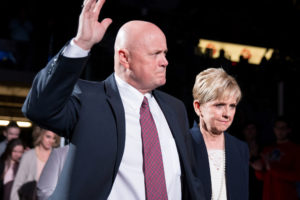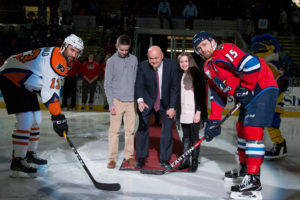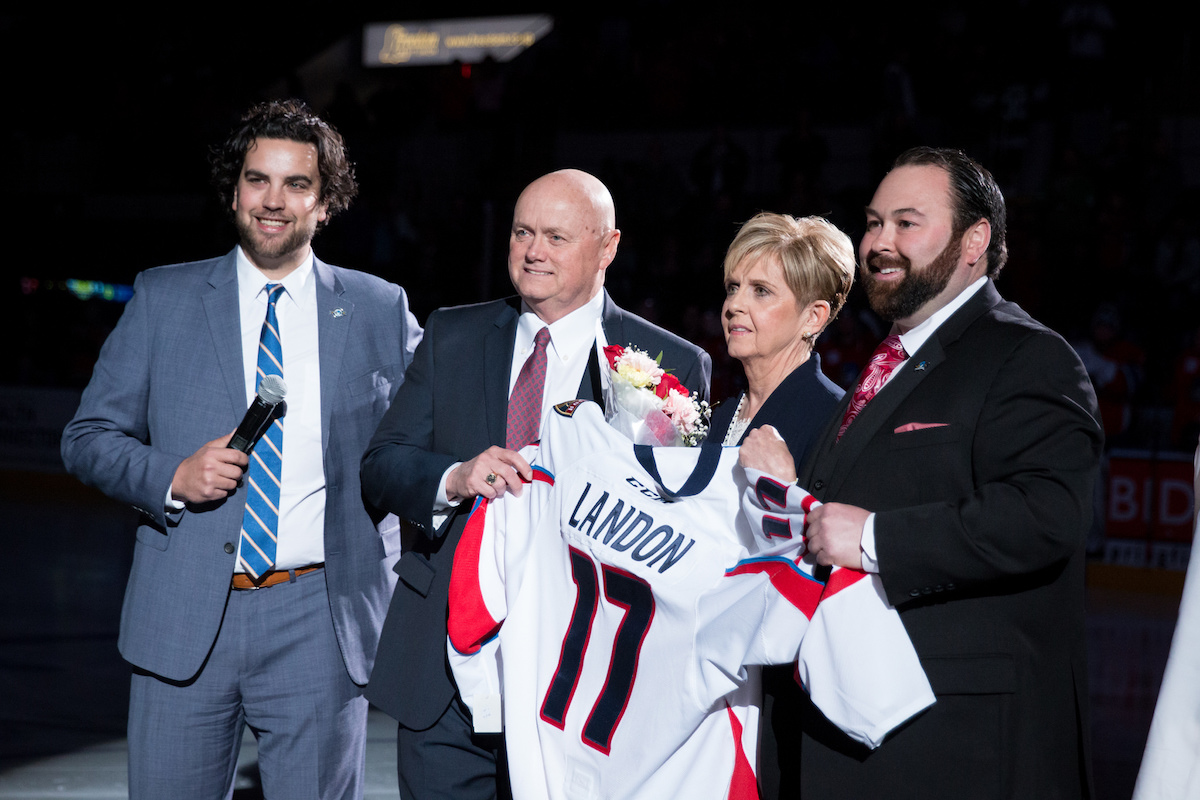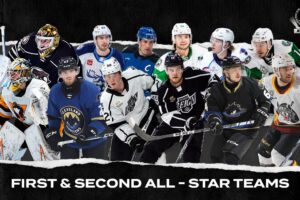by Ryan Smith | AHL On The Beat
To some, the definition of a legend reflects statistical accomplishments – accolades that are tangible and able to tell their own story of a legacy that changed the game. Often times, individual records and awards are the basis of being considered legendary.
But there is another intangible way to define a legacy: mainly, the ability to time and time again, be the driving force for an entire community.

When he finally steps away from the American Hockey League in April after five decades of service, Norman Bruce Landon will unequivocally be remembered as a pioneer and, in no uncertain terms, a savior of hockey in the AHL’s headquartering city.
Landon’s career was not supposed to turn out this way, ironically. As a 20-year-old rookie goaltender with the Springfield Kings in 1969, Landon arrived with visions of reaching the NHL following his selection by the Los Angeles Kings in the fourth round of the 1969 NHL Amateur draft.
When Landon’s playing career had to be halted due to injuries in 1978, he was just 28 years old, but his time in Springfield would be far from finished. After taking on roles with the Indians’ public relations and media relations departments, Landon’s dedication quickly earned him a promotion to general manager in 1982.
Just eight years later in 1990, Landon helped the Indians embark on a two-year run that would finish with two Calder Cup championships with two different NHL affiliations, the Islanders and Whalers. Adding to the magnitude of this unique accomplishment, Landon and head coach Jim Roberts turned the Whalers’ affiliate from a last-place club that won just 11 games in Binghamton in 1989-90 into a championship squad that won 43 regular season games before roaring through the Calder Cup playoffs en route to Springfield’s seventh Cup.
Three Calder Cups in the span of 20 years would have made Landon a memorable figure. However, his biggest achievements were still looming.
The first of those came in 1994. With the Springfield Indians moving on to Worcester, AHL hockey was not guaranteed to remain in Western Massachusetts. That is, until Landon secured an expansion franchise alongside former teammate Wayne LaChance. For the next 22 years, Landon was closely involved with the city’s fourth different iteration of AHL hockey, and in doing so, he made sure his players, colleagues and business staff all knew one thing.
“You didn’t work for me, you worked with me, and you all had my back so many times,” Landon said.
When the Falcons were sold to the Arizona Coyotes in April of 2016, there was uneasiness again in Springfield. As Landon referenced on more than one occasion, he was said to be retired because it sounded better than “unemployed.”
A constantly moving man, even at age 66, Landon again refused to let Springfield hockey become only a memory. Under Landon’s guidance, a Springfield based team of businesspeople revived AHL hockey again, introducing the Thunderbirds just two months later.
One cannot even walk by the MassMutual Center without Bruce Landon being a part of their surroundings. “Bruce Landon Way” now adorns the street where thousands have filed into the Civic Center and MassMutual Center box office for parts of the last 45 years.
While the Thunderbirds entered this month outside of the playoff picture, what they had earned, and what their fans truly got to applaud, was the renewed sense of appreciation for the man who has been at the epicenter of Springfield hockey for almost all of his adult life.

When Landon was honored with his own night on March 3, 2017, his humility, as it so often has done over the years, once again superseded all of his individual accomplishments.
“I don’t believe I deserve (my own night) sometimes, but I will enjoy it,” Landon told Western Mass News days before his ceremony.
With applause doing its best to stop Landon’s speech in its tracks, he did his best to classify the pride he felt in his home of five decades.
“You don’t get a chance to spend almost 50 years in this wonderful game of ours without the support of so many people,” Landon said to over 5,000 patrons inside the MassMutual Center.
https://youtu.be/929ZQo9m-Bc
His number one supporter? His wife Marcia, who has been his co-pilot for 47 years’ worth of journeys, and future companion for retirement, where one specific bucket list item remains near the top.
“I’ll look forward to actually coming to a game next year, and as I jokingly say, I’ll be able to come to a game for the first time in my life and have a beer, and if I want to leave after the second period, I can leave.”
Thunderbirds’ management has seen firsthand the impact Landon has brought to Springfield. Executive Vice President Nathan Costa, a Springfield native who grew up on Indians and Falcons hockey, voiced the city’s praise and thanks.
“He has been so instrumental in bringing hockey back to Springfield. We really could not have done it without you, Bruce,” Costa said, echoing the gratitude of thousands who, thanks to Landon, created lifelong memories inside the walls of the rink.
What defines a legacy? How is such a legacy quantified and compared to that of other legends in the world of sports? For Norman Bruce Landon, only one accomplishment needs to be at the top.
“When I leave this building for the very last time, I feel most proud about one major accomplishment that is true to my heart: I can walk away from hockey now knowing that professional hockey will be in Springfield for a long, long time.”
And that’s a legacy worth preserving forever.






































